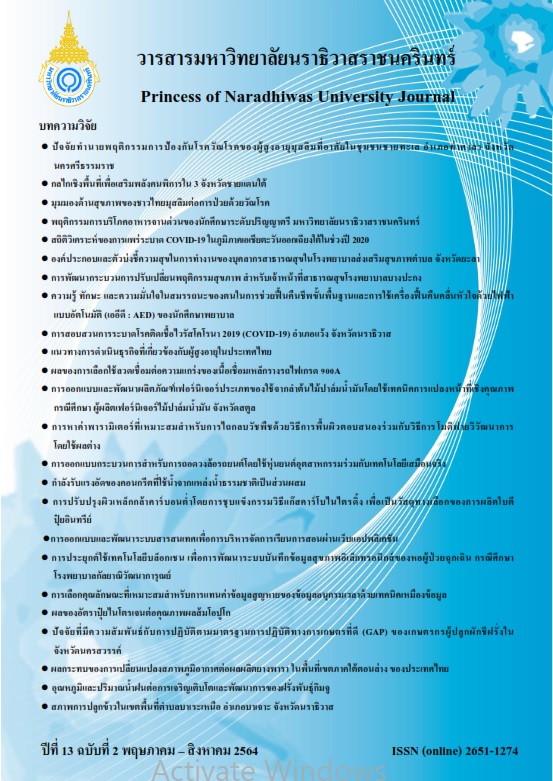Area-Based Mechanism for Empowerment Persons with Disabilities in 3 Southern Border Provinces
Keywords:
Empowerment of persons with disabilities, Area-based mechanism, 3 Southern border provincesAbstract
The purposes of the research were: (1) to study the area-based mechanism for empowerment persons with disabilities and (2) to do the case study of persons with disabilities on the quality of life in 3 southern border provinces of Thailand by following the standard indicators of quality of life for persons with disabilities in 3 southern border provinces of Thailand. The Population and sample consisted of 12 people working with persons with disabilities and 30 disabled participants located Pattani, Yala and Narathiwat provinces, who were willing to participate in the study. The research instruments were an interview form and a questionnaire to assess the quality of life of persons with disabilities. The data was analyzed using content analysis and SWOT analysis.
The results found that the area-based mechanism for empowerment persons with disabilities was succeeded with the collaboration among the government offices, agencies and local people. The process started from the training of area-based mechanism, doing case management to access the information including (1) interview for services, (2) building cooperation in services, (3) reporting and recording the cases, and doing the individual plan to improve the quality of life of persons with disabilities including the process of supervision, monitoring and evaluation. Moreover, the study found that doing the individual plan should divide persons with disabilities into 2 groups: 1) persons with disabilities who need help should focus on the areas of adjustment to their disabilities such as counseling, the survey to find their needs of accessibility and the guideline for the government agencies to provide assistance that fits with the area context and 2) the successful persons with disabilities should focus on the development of their capability, their family supports and participation in the community network.
References
Adams, R., (2008). Empowerment, Participation and Social Work (4th ed.). British: Palgrave Macmillan.
Brown, I., & Brown I. R. (2003). Quality of Life and Disability: An Approach for Community Practitioners (1st ed.). USA: Jessica Kingsley.
Department of Empowerment of Persons with Disabilities. (2014). Standard criteria for promotion and development of the quality of life of the disabled. Bangkok: Department of Promotion and Development of the Quality of Life of the Disabled. (in Thai)
Department of Empowerment of Persons with Disabilities. (2017). The 5th National Plan for Life Development of Persons with Disabilities (2017-2021). Bangkok: Department of Empowerment of Persons with Disabilities, Ministry of Social Development and Human Security. (in Thai)
Department of Empowerment of Persons with Disabilities. (2020). Situation of Persons with Disabilities. Retrieved October 10, 2021, from http://www.dep.go.th/th/law-academic/ knowledge -base/
Holloway, I. W. (2010). Qualitative research in nursing and health care (3rd ed.). India: Laserwords Privates
Office of the National Security Council. (n.d.). Administrative and Development Policy of the Southern Border Provinces in 2017 – 2019. Retrieved January 10, 2021, from http://www.nsc.go.th/wp-content/uploads/2018/
Roessler, R. T., & Rubin S. E. (2006). Case management and rehabilitation Counseling: procedure and techniques (4th ed.). Austin, TX: PRO-ED
Sangchan, T. (2013). Networking of Disabilities Independent Living People a Case Study of Phutthamonthon Independent Living Center. Veridian E-Journal,Silpakorn University, 6(1), 165-181.
Sutthaso, S. (2016). Strategy for Local Government Development. Journal of Nakhonratchasima College, 10(1), 377-387.
Upton, D., & Beck, R. (2002). Case management: Rehabilitation applications and administrative implications. Journal of Rehabilitation Administration, 26(1), 39-46.
Wisilapanon, P., Sirikwanchai, S., Wisuthiphan, P., Neelapaijit, A., Rattakorn, P., Boonchatkul, S., et al., (2014). Empowerment, chance creation and the equality in society for Persons with Disabilities. Faculty of Social Sciences and Humanities, Mahidol University Research report. (in Thai).
World Health Organization. (2005). Community-based rehabilitation (CBR), Retrieved January 10, 2021 from http://www. who.int/disabilities/cbr/en




